#and writing it all out in hanzi
Explore tagged Tumblr posts
Text
got through everyone listed on the novel wiki page (that i could find names for. there’s still two people i can’t track down names for, and the raws are locked behind vip so—), took one look at the general/show character list, and let out a pitiful groan. so. i think it’s time to be done with this project for the day.
#i will continue……..tomorrow#my methodology is literally just taking the names and every nickname listed or that i can remember#and writing it all out in hanzi#i’ll deal with the pinyin at a later date. not now though#c.txt
0 notes
Text
trying to research historical vietnamese clothing lead me down a rabbit hole i wasn't prepared for
#by which i mean i see a lot of people claiming that the vietnamese and the koreans 'stole' chinese hanfu#a few of those people had chinese flags in their usernames or bios but all the comments im talking about are in english#for clarity's sake#they're like posting pictures of old vietnamese and korean art along with chinese art and pointing out the similarities in the clothes#while saying shit like 'the thieving viets stole chinese culture!!'#admittedly im not an expert on east and south east asian history#and i know there's bad blood between them#but i *do* know that china occupied vietnam and korea at different points in their histories#and in vietnam's case it happened in the han dynasty which was like 200 BC to 250 CE#(but not throughout that entire era)#and in both countries china had such a strong influence in the politics and culture#like vietnam used chinese hanzi for writing since the han dynasty and in korea#the chinese language has influenced the korean language since like 100 bce#i mean most korean surnames are classified as sino-korean in origin#i just don't think you can accuse nations of stealing a culture that's been a huge influence on theirs for thousands of years#mickey.txt
2 notes
·
View notes
Photo
These represent the main 7 language groups (+a few dominant languages within the groups) that are currently spoken in China and fall under the Chinese (Sinitic) language family.
Frequently, all languages under the Sinitic umbrella are colloquially translated as "dialects" - a common reason being that they mostly* share a writing system (汉字 hanzi). However, linguistically speaking, they are not dialects, as that requires speakers of different dialects to understand each other with not too much difficulty (mutual intelligibility). (To add to the confusion, regional variation within the local languages commonly split along urban--suburban/rural dialects. Furthermore, there are regional dialects of Mandarin Chinese, as it is the lingua franca of the nation.) Languages in the same language group typically are not mutually intelligible with each other as they are still different languages. For a more clear example: Shanghainese is a dialect of Northern Wu, a language of the Wu language group, which belongs to the Sinitic (or Chinese) language family. Shanghainese is mostly intelligible to other speakers of Northern Wu, has varied intelligibility %s to speakers of other Wu languages, and very low mutual intelligibility with speakers of other Sinitic languages like Mandarin.
The linguistic geography of China is incredibly diverse. For the most dominant language FAMILIES (eg not just the Sinitic languages) spoken here's a map pulled from wikipedia:

Additionally, many minority languages have state support and are taught in schools in regions where they are locally spoken.
* It's a bit complicated to explain... tldr: So, to say that all Sinitic languages share the same writing system is kind of true, but also is not true.
Historically speaking much of the sinosphere or areas influenced by Chinese culture used Literary or Classic Chinese, which was more or less codified when people still spoke Old Chinese. Because of the predominantly logographic nature of 汉字 hanzi, variations in pronunciations of words between languages didn't pose a big issue in continuing to use and understand Literary Chinese.
However, Literary Chinese did not undergo natural linguistic evolution the way that Old Chinese -> Middle Chinese & diversified Chinese languages, so Literary Chinese largely preserves the grammar of Old Chinese and also -where it can- preserves the scarcity of mutlisyllabic words (that are now prevalent in most currently spoken forms of Chinese). The tradition of reading aloud works written in Literary Chinese is/was still done, but more along the lines of memorization and continued use in written form, and not along the lines of reviving its use as a spoken language.
There were several literary movements (old as 1300s Yuan dynasty and as recent as 1920s) that sought to use vernacular instead of Literary Chinese, initially for plays and stories intended to be spoken instead of only read. The later movements, such as the 白话文 baihuawen movement, also had increased literacy as one of its goals, because Literary Chinese was hard to learn for non-scholars/ordinary people. It took place before Standardized Mandarin was chosen as lingua franca and also before Simplified Chinese (writing system - a 汉字 hanzi variety) was compiled. The preferred dialect chosen by many of the writers was not Mandarin, but Jianghuai, also known as "Lower Yangtze Mandarin 下江官话" which was the lingua franca of Ming and Qing dynasty China. "Mandarin" in this sense is the transferred from Portuguese (Portugal had oldest European colonial outpost in Chinese territory - Macau) translation of 官 "(government) official".
Related to baihuawen movement is the development of 汉字 hanzi characters specifically used in Cantonese and Hokkien, to better reflect parts of speech variants found in their respective languages that aren't in the lexicons of other Sinitic languages. Also because of the nature of linguistic evolution, some Sinitic languages preserve older (archaic) forms from parent languages, and as such, some of them use "archaic" characters for written vernacular. Others come up with new/separate characters

Map of Chinese languages (Varieties of Chinese) in China and Taiwan, excluding Chinese counties where a Chinese language is not spoken by more than 50% of the population at home.
#maps#linguistics#prev most of these chinese languages are spoken by ethnically han chinese#not to burst your bubble but to fill in details about china. han ethnicity is really big & not particularly homogeneous.#unfortunately the regional varieties of Chinese languages aren't usually given the same care as minority languages --#in the 80s there was a push to discourage kids from speaking regional language during school in favor of pushing Mandarin the lingua franca#which for national + economic development reasons is important especially since it's not simply 'everyone can use the same writing system'#because there ARE lexical and grammatical differences between all these languages --#they're not just reskinning hanzi 汉字 using different pronunciations (this is a common misconception)#yes there is a writing system in common but it really doesn't perfectly accommodate lexical variation#at least in vernacular - for example: first person pronoun cognates: 我 吾 俺#ok this has been sitting in my drafts for over a month i'm just gonna let it out#🇨🇳
281 notes
·
View notes
Note
Now I'm wondering how countries like Japan and China teach literacy.
Since kanji / hanzi don't really have that much in the way of phonetic elements, they kinda have to teach them by memorization and I don't think they have many reading comprehension problems over there.
(Although both countries do have supplementary phonetic writing systems in the form of bopomofo and pinyin for China, and the kanas for Japan)
--
FAVORITE SOAPBOX TOPIC UNLOCKED!
RELEASE THE KRAKEN!
It's a little closer to teaching vocabulary than spelling, but the same kinds of principles apply: You teach the building blocks, like the traditional radicals, which aren't so different from teaching Latin and Greek roots in an English class for English speakers.
And, as a matter of fact, lots of those radicals do predict pronunciation, just not in every single case. They can also be clues to meaning, but again, not absolutely consistently. Many characters have a sound-cueing radical on one side and a meaning-cueing radical on the other. It's just that only some are still useful in the modern day, while others are more like the English word 'plumbing' where knowledge of Roman lead pipes explains why this word comes from the one for lead, but the root probably wouldn't help a kid learn the word in the first place.
One similarity to teaching phonics would be teaching students to tell very complicated and similar characters apart: you want to help a student spot all the little building blocks of the character and then spot the ones that are different, not just glance at the whole character and get a general overall vibe. If you do a whole look-based approach, too many characters are too easy to mistake for one another.
Remembering a bajillion Chinese characters is hard if you're trying to memorize them in a year and not all of elementary school, but I think people who don't read them underestimate how many component parts there are and how approachable they can be if you start by learning fundamentals, not just memorizing a few individual characters as though they have no relation to anything else.
They're actually pretty systematic, just in the way that English spelling is with its overlapping systems and historical artifacts, not in the way that highly regular Spanish spelling is.
Having taken a lot of Japanese classes, I will say that Japanese as a foreign language textbooks often do a piss poor job of this and totally do teach kanji in a sight words-y way... But my Mandarin class started with important foundational concepts that served me well in Japanese later even if I bombed out of Chinese class at the time.
Can you tell how irritated I am by all the foreign language learners who think characters are sooooo hard when, really, it's just their crappy textbook? Haha.
They're moderately hard in the way that learning a full adult spectrum of vocabulary is hard, but people do that for foreign languages all the time. The countries that use characters do tend to make sets that are smaller for certain kinds of applications, same as we have things like simple English wikipedia, but a literate adult will always know lots more, whether it's from their career in engineering or their predilection for historical romance novels.
Uh... anyway, the answer is "Bit by bit in elementary school, just like in any other country".
682 notes
·
View notes
Text
thoughts about the Cardassian writing system
I've thinking about the Cardassian script as shown on screen and in beta canon and such and like. Is it just me or would it be very difficult to write by hand?? Like.

I traced some of this image for a recent drawing I did and like. The varying line thicknesses?? The little rectangular holes?? It's not at all intuitive to write by hand. Even if you imagine, like, a different writing implement—I suppose a chisel-tip pen would work better—it still seems like it wasn't meant to be handwritten. Which has a few possible explanations.
Like, maybe it's just a fancy font for computers, and handwritten text looks a little different. Times New Roman isn't very easily written by hand either, right? Maybe the line thickness differences are just decorative, and it's totally possible to convey the same orthographic information with the two line thicknesses of a chisel-tip pen, or with no variation in line thickness at all.
A more interesting explanation, though, and the one I thought of first, is that this writing system was never designed to be handwritten. This is a writing system developed in Cardassia's digital age. Maybe the original Cardassian script didn’t digitize well, so they invented a new one specifically for digital use? Like, when they invented coding, they realized that their writing system didn’t work very well for that purpose. I know next to nothing about coding, but I cannot imagine doing it using Chinese characters. So maybe they came up with a new writing system that worked well for that purpose, and when computer use became widespread, they stuck with it.
Or maybe the script was invented for political reasons! Maybe Cardassia was already fairly technologically advanced when the Cardassian Union was formed, and, to reinforce a cohesive national identity, they developed a new standardized national writing system. Like, y'know, the First Emperor of Qin standardizing hanzi when he unified China, or that Korean king inventing hangul. Except that at this point in Cardassian history, all official records were digital and typing was a lot more common than handwriting, so the new script was designed to be typed and not written. Of course, this reform would be slower to reach the more rural parts of Cardassia, and even in a technologically advanced society, there are people who don't have access to that technology. But I imagine the government would be big on infrastructure and education, and would make sure all good Cardassian citizens become literate. And old regional scripts would stop being taught in schools and be phased out of digital use and all the kids would grow up learning the digital script.
Which is good for the totalitarian government! Imagine you can only write digitally. On computers. That the government can monitor. If you, like, write a physical letter and send it to someone, then it's possible for the contents to stay totally private. But if you send an email, it can be very easily intercepted. Especially if the government is controlling which computers can be manufactured and sold, and what software is in widespread use, etc.
AND. Historical documents are now only readable for scholars. Remember that Korean king that invented hangul? Before him, Korea used to use Chinese characters too. And don't get me wrong, hangul is a genius writing system! It fits the Korean language so much better than Chinese characters did! It increased literacy at incredible rates! But by switching writing systems, they broke that historical link. The average literate Chinese person can read texts that are thousands of years old. The average literate Korean person can't. They'd have to specifically study that field, learn a whole new writing system. So with the new generation of Cardassian youths unable to read historical texts, it's much easier for the government to revise history. The primary source documents are in a script that most people can't read. You just trust the translation they teach you in school. In ASIT it's literally a crucial plot point that the Cardassian government revised history! Wouldn't it make it soooo much easier for them if only very few people can actually read the historical accounts of what happened.
I guess I am thinking of this like Chinese characters. Like, all the different Chinese "dialects" being written with hanzi, even though otherwise they could barely be considered the same language. And even non-Sinitic languages that historically adopted hanzi, like Japanese and Korean and Vietnamese. Which worked because hanzi is a logography—it encodes meaning, not sound, so the same word in different languages can be written the same. It didn’t work well! Nowadays, Japanese has made significant modifications and Korean has invented a new writing system entirely and Vietnamese has adapted a different foreign writing system, because while hanzi could write their languages, it didn’t do a very good job at it. But the Cardassian government probably cares more about assimilation and national unity than making things easier for speakers of minority languages. So, Cardassia used to have different cultures with different languages, like the Hebitians, and maybe instead of the Union forcing everyone to start speaking the same language, they just made everyone use the same writing system. Though that does seem less likely than them enforcing a standard language like the Federation does. Maybe they enforce a standard language, and invent the new writing system to increase literacy for people who are newly learning it.
And I can imagine it being a kind of purely digital language for some people? Like if you’re living on a colonized planet lightyears away from Cardassia Prime and you never have to speak Cardassian, but your computer’s interface is in Cardassian and if you go online then everyone there uses Cardassian. Like people irl who participate in the anglophone internet but don’t really use English in person because they don’t live in an anglophone country. Except if English were a logographic writing system that you could use to write your own language. And you can’t handwrite it, if for whatever reason you wanted to. Almost a similar idea to a liturgical language? Like, it’s only used in specific contexts and not really in daily life. In daily life you’d still speak your own language, and maybe even handwrite it when needed. I think old writing systems would survive even closer to the imperial core (does it make sense to call it that?), though the government would discourage it. I imagine there’d be a revival movement after the Fire, not only because of the cultural shift away from the old totalitarian Cardassia, but because people realize the importance of having a written communication system that doesn’t rely on everyone having a padd and electricity and wifi.
#if I read over this again I will inevitably want to change and add things so I'm refraining from doing that. enjoy whatever this is#forgive my very crude recounting of chinese and korean history! I am neither a historian nor a linguist#but I will NOT apologize for talking abt china so much. that's my culture and I'm weird abt it bc of my family history#and it's my GOD GIVEN RIGHT to project what little I know abt it onto all my worldbuilding#also I've never actually read abt any of the various cardassian conlangs but I'm curious if this contradicts or coincides with any of them#I still want to make my own someday. starting college as a linguistics major (in 2 weeks!!) so presumably I will learn how to do that#narcissus's echoes#ds9#asit#star trek#cardassians#cardassian meta#a stitch in time#hebitians#lingposting
739 notes
·
View notes
Text
Regarding ojalá - it does specifically come from Arabic, though the actual phrase in Arabic is supposedly lawshallah but has frequently been compared to "inshallah"
The base is the same; -alá there refers to Alá or "Allah" so in etymology it's still like "God willing" if you look at it that way
Also it says Old Spanish oxalá - Old Spanish is like the Medieval form of Spanish, so it has more spelling differences where X later turns to J; this is why in modern Spanish it's Don Quijote but if you look at the original covers/writings for it, you see something like Don Qvixote where the V was the U and X turns to J....... really old Spanish sometimes has the Ç
And additionally in southern Spain or more Muslim-controlled areas like Al-Andalus [Andalusia] you would also see aljamía which used an Arabic alphabet of Romance Languages (and Mozarabe) to sort of approximate what was being said/understood. The equivalent would be something like writing out a Russian or Chinese name because we understand the Latinized alphabet but not Cyrillic or hanzi

Someone did mention that ojalá can also come across as more impersonal because it isn't specifically a conjugation which is true - espero or esperamos for "I hope" and "we hope" is more personally putting a subject in there
While ojalá can come out like "hopefully"; and it can be used in imperfect subjunctive as a contrary to fact statement which is why they put "if only"
-
Also, side note - I don't know Portuguese but I'd be willing to bet that they have an expression like ojalá too because the Moorish/Islamic influence was on all of the Iberian peninsula, not just Spain
Spanish and Portuguese (and the other Iberian Romance Languages) tend to share more linguistically than French or Italian in some respects, particularly you'll see more Arabic influences in the Iberian ones while French and Italian remain much more Latinized
44 notes
·
View notes
Text
MLCB fandom, I have to share a little translation tidbit with you, because it's been making me laugh since I saw it and I think you all may find it amusing too.
Many members of our fandom write bilingual posts (generally English and Mandarin), so I've developed the habit of tossing things into Pleco as I go to get a general gist of what I'm missing, because my Mandarin is nowhere close to good enough to read without help.
@difeisheng posted something the other day that included some Mandarin, so I tossed it into Pleco. And in amongst what they'd written were the hanzi for "A-Fei", which I have apparently never tossed into Pleco before.
MY FRIENDS.
HERE IS WHAT PLECO DID WITH THAT. XD
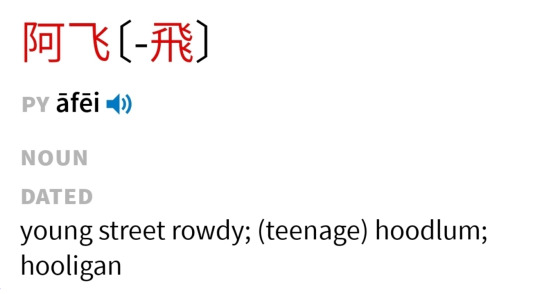
阿飞 (ā fēi) hoodlum; hooligan; young rowdy
...you CANNOT tell me that Li Lianhua (or Li Xiangyi, depending on when this nickname was first bestowed) didn't pick that particular nickname knowing EXACTLY WHAT IT MEANT.
And following that, DI FEISHENG ALLOWED HIM TO USE IT.
Li Lianhua (and now Fang Duobing) are running around the jianghu calling the head of Jinyuanmeng a hooligan and he's just like "today has already been so weird, so this might as well happen" and GOES WITH IT.
...I still don't know what to think about this but it's amusing the hell out of me.
(If anyone with better Mandarin than I have wants to jump in and add anything, please feel free, but I think this is a permanent part of my mental image of these two now. XD)
#mysterious lotus casebook#di feisheng#li lianhua#di feisheng & li lianhua#feihua#dihua#names#translations#mlcb meta#idk#does this count?#why not#XD
84 notes
·
View notes
Note
Hello! Do you know that scene in mdzs where jyl comes to yiling with jc to show wwx her wedding dress?
What is your interpretation of wwx's attitude towards jc here?
I always thought he sounded pissed at him almost the entire time, telling him to shut up, saying it's none of his business when asked a question and getting annoyed at jc provoking him by toasting to the "yiling patriarch"
I've seen some comments where other people's reactions were something along the lines of "glad they're still friends" or laughing at the "banter" in this scene and I have a completely different view on this so i got curious and wanted to ask what do you think? And if you know how is it written in Chinese, what the tone of this scene is?
Maybe I got the wrong idea but it's almost uncomfortable for me how cold wwx is to jc in that scene, and justifiably so considering how jc fucked him over last time they met
Hello there anon!
For the scene in question (Seven Seas Edition)


The hanzi of it:
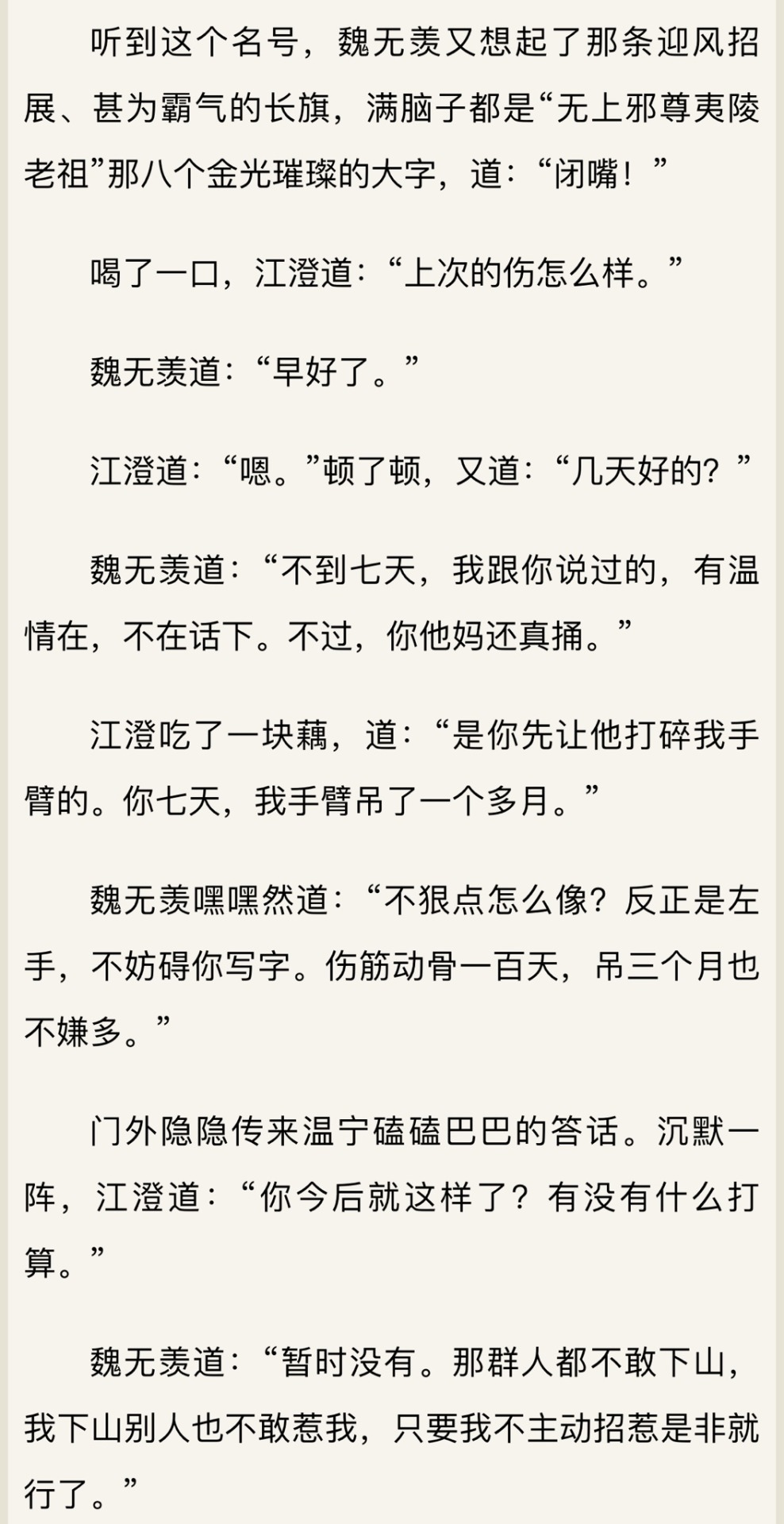
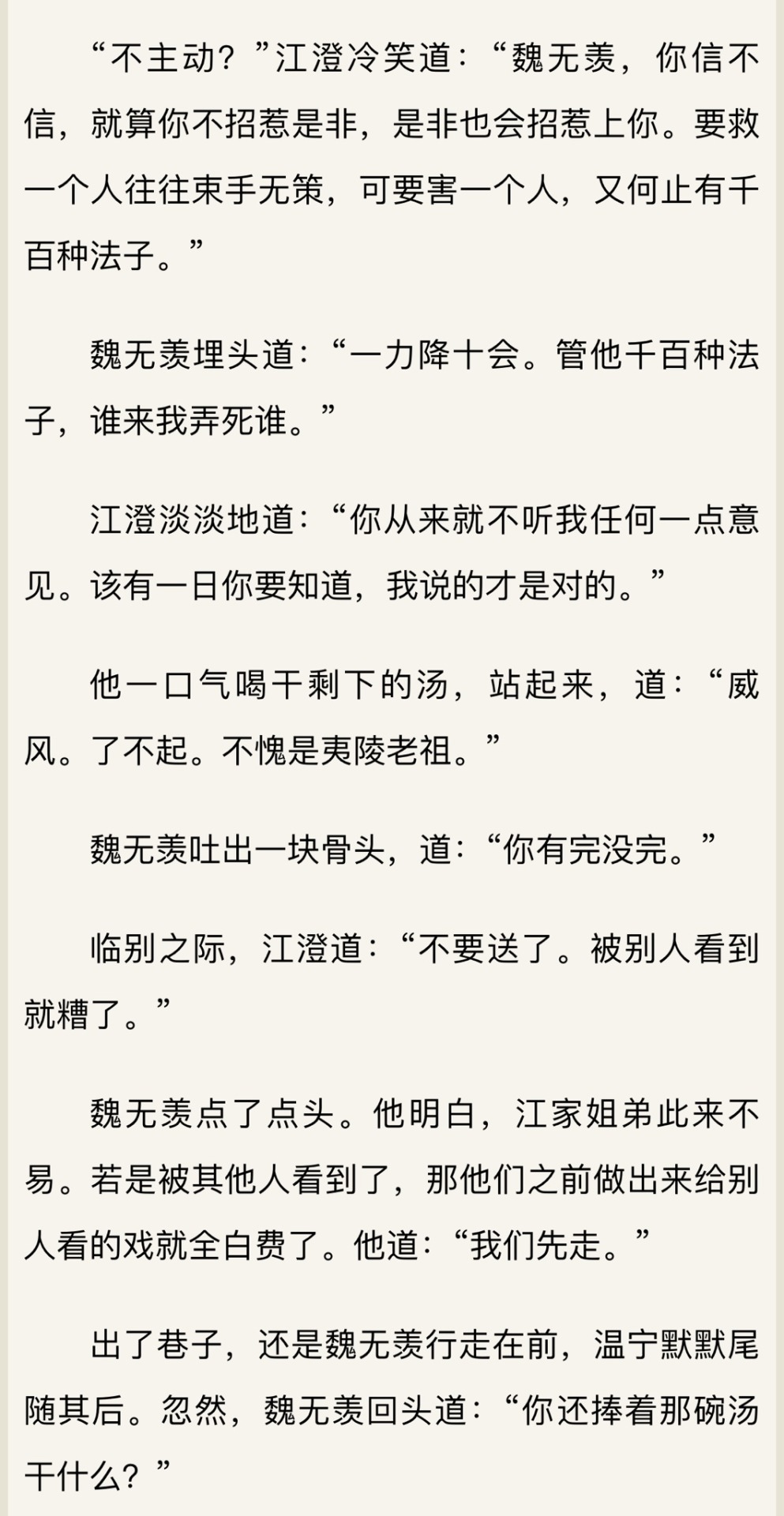
My translation:
Hearing this title, Wei Wuxian thought again of that domineering long flag fluttering in the wind, and his mind was filled with eight bright golden characters reading "Supreme Evil Lord Yiling Patriarch", and said, "Shut up!"
After taking a sip, Jiang Cheng asked, "How is your injury from last time?"
Wei Wuxian said, “It’s already healed."
Jiang Cheng hummed, "Ahh," After a pause, he added, "How many days did it take?"
Wei Wuxian replied, "It's been less than seven days. I told you, with Wen Qing, there's no need to worry. But, you were really fucking violent."
Jiang Cheng ate a piece of lotus root, "You asked him to break my hand first. You were sitting for seven days, and my arm was hung up for more than a month. "
Wei Wuxian hesitantly laughed and said, "How could I have not been cruel? It was your left hand anyway so it didn't prevent you from writing. A hundred days of broken muscles and bones to heal, three months of waiting isn't long."
Wen Ning's stuttering reply could be heard faintly outside the door. After a moment of silence, Jiang Cheng said, "Is this what you're going to do from now on? Do you have any plans?"
Wei Wuxian said, “Not sure. Those people don’t dare to go up the mountain, and no one dares to mess with me when I go down the mountain. As long as I don’t take the initiative to cause trouble, it's fine."
"Not taking the initiative?" Jiang Cheng sneered, "Wei Wuxian, believe it or not, even if you don't cause trouble, trouble will still find you. There is often nothing you can do to save someone, but there are more than a thousand ways to harm someone."
Wei Wuxian lowered his head, "One force with enough effort can defeat many, no matter the method. So, I will kill whoever comes. "
Jiang Cheng calmly said, "You never listen to any of what I tell you. One day you will know that what I say is right."
He drank the rest of the soup in one breath, stood up, and said: "Awesome. Amazing. As expected of the Yiling Laozu."
Wei Wuxian spat out a piece of bone, "Are you done yet?"
Before leaving, Jiang Cheng said, "Don't see us off. We don't want to be spotted."
Wei Wuxian nodded. He understood that this was not an easy journey for the Jiang family siblings. If others saw this, all the drama they put on for others would be in vain.
He said, "We'll go first."
So, as to my take for this, it's less of anyone is truly angry, as it is waiting for something to happen. The situation is played as a simple meeting when it no longer is, can't be, and will never be. There is a lack of this foreboding that overshadows the scene in the seven seas translation. Something I am not fond of as it uses more banter than Wei Wuxian exhibits in the scene. (Where snickers and the weird tone comes from with Wei Wuxian being surprised he was stabbed basically just brings more ire than I want that doesn't pertain to this question)
I think it's less that Wei Wuxian is angry at anything more than understanding what point they are at and him fully expressing he doesn't want anything further endangering him or the Wens after the defection was over and done with. If they keep low as he intends to, all could move on. Jiang Cheng of course doubts this as he thinks Wei Wuxian can't do anything else but cause trouble in his efforts to help. Two opposing sides of leave well enough alone, or, step in once again against cruelty despite the hurt.
#mdzs#mo dao zu shi#translation fun#wei wuxian#jiang cheng#each of their conversations consist of the same thing#Jiang Cheng adamantly against helping others because of the consequences#and Wei Wuxian stepping in to help despite those consequences#it's not about if they're still friends or friendly#it's a diometric shift of philosophies played in front of us and hanging
55 notes
·
View notes
Text
Hanzi update (+accidental trauma talk)
tw illness, trauma, vomiting, weight loss, recovery. I didn't plan to write about this but because of what happened in the last year I can't really write about how I studied Chinese without talking about it. so. but it's mainly about hanzi lol
I've been learning how to write traditional characters with the vague idea that I'd go and study in Taiwan, and also that if I want to write Classical Chinese or Japanese they're far more useful - but the program I want to go to Taiwan for requires HSK7, which I DO not think I can achieve and have the results of before March. Who knows! Perhaps within me lies untold brilliance and dedication!!
...well, I wouldn't rely on it. (I am also busy with a job, a partner, studying an A-level course to begin tutoring it in September, and writing the second draft of my novel.)
And even if I ended up going to Taiwan with my absolutely fantastic HSK7, there's no way I could handwrite all of those words within a year. If I learn 10 characters a day, that's like 3650 characters in a year, but realistically that will never happen - and you still have to actually remember them.
I also know from my last experience where I learnt a stupid amount of characters very quickly (about 800 in two weeks) that I can technically do it, I have a very large swollen brain, but then the brain, being very large and very swollen, promptly burns out. And leaves me to not do any Chinese again for like two months. So basically - completely pointless, because after those two months of rest I had forgotten most of them anyway. I will not be doing that again.
This time around I have been slowly, very slowly, learning things on Skritter. I have about 400 characters so far. I'm not doing words but doing characters, which is a bit slower, but I figure it'll be more useful in the long run. After I have the first 1000, I'm planning to then systematically go through the HSK and TOCFL lists and check I know how to put characters together and which 'jing' is used in 'yijing' etc.
This approach is only really going to work because I know a lot of vocabulary and can read a lot of stuff already - otherwise I wouldn't recommend to anybody without that backbone of vocabulary to just learn random isolated characters, unless you're masochistic or much harder-core than I am.
As I have said in a lot of posts before, I had a very difficult experience in China last August and have basically taken an entire year off studying because in all honesty I just couldn't bring myself to face the language again. Every time I tried I had this crazy grief and nightmares and stress response. What I went through was so stressful that during those two months in China that I lost seven kilograms, as I couldn't eat much without vomiting it back up due to stress and fear, didn't sleep, and ended up having to leave for Thailand pretty severely malnutritioned - which then made me susceptible to illnesses there and I spent the next two months after with awful health, vomiting and weak and generally sick. Luckily I was with friends and I gained the weight again and my period and digestive system sorted itself out.
And I never expected that a language itself could carry trauma? Like. Nobody died, it wasn't like that, I wasn't abused or assaulted or anything but still...for just under a year, every time I spoke or heard or read Chinese I couldn't help thinking of those two months. Even now it's still hard. I'm finding my way back to it but, to be honest, I didn't expect how hard it would be. I thought I could just - move past it, because I'd already had so many great experiences in China and Taiwan and with Chinese, that they would cancel each other out or at least be aided by the huge amounts of love that the language has shown me. Alas, it was not the case.
Anyway. All of that to say - I have only managed to do about 400 characters in a year, because I essentially gave up studying completely.
Now I've just finished reviewing and re-remembering those 400 characters on Skritter, so I'm ready to start again! I don't know what's changed, I guess just time - I feel more positive, I feel curious and interested about the language again. I don't know. I'm not going to question it too deeply. But for these past two weeks, I've been having a lot of fun :)
I'll update everyone on my progress as I go! Next post - 500.
#meichenxi manages#langblr#lingblr#who is still around learning chinese from the old gang?? say hiiiiiii#this is a complete mess lol but basically. I have finished 400 characters in review on skritter#I'm essentially a god#梅晨曦下凡了!!!#凡间有那么多好吃的 我还是留下来吧!
21 notes
·
View notes
Text
Thoughts I had during TGCF S2 Ep 8
Starting this week, I’ll be finishing my TGCF S2 Reactions!
Now here we go!
Previously on TGCF…
-That’s a lot of Orcs
-Man, I’m surprised none of Qi Rong’s lackeys are noticing disguised!Xie Lian and Hua Cheng and are like, “What? I don’t remember the boss hiring ghosts more eye catching than we are.”
-“Oh? Would you like me to do that?” That delivery was awesome and it got Xie Lian adorably flustered!
-They have fangs!
-XL, you stopped two guys in a sword fight in Ep 5 you’ll still come out on top
-That’s the only quality he respects
-They’re still blending in
-That’s a lot of humans
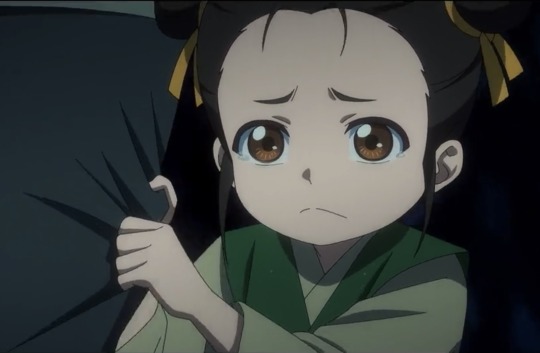
-Baby Guzi!!!
-A new disguise!!!
-He’s returned
-Xie Lian looks great as a mortal in disguise
-There’s like 20 of them
-I’m surprised another lackey is noticing disguised Xie Lian and San Lang at the end of line and says, “Hey, I don’t remember capturing those last two. Shouldn’t we tie ‘em up with the other humans?” And then the other ghost just goes “Nah, our king we’ll be pleased with two more for his feast.”
-That creepy odd flute music
-Aw baby Guzi
-Whoever did this track, props
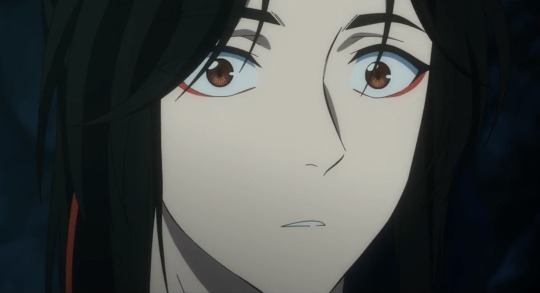
-He touched his hand!!!
-He’s writing hanzi!
-San Lang understood!
-San Lang’s still savoring the touch!
-Now San Lang has a message too!
-In other words he just wrote, “Heads up”
-*Content Warning for Accidental and unintentional Cannibalism*
-Gross
-That ain’t meat jerky
-Thank you San Lang
-That music keeps getting creepier as they travel deeper
-His throne room
-Ugh that ain’t chili
-San Lang’s enraged!
-That Xie Lian statue
-Oh no that statue was beaten in the past!
-They took their anger out on a young man who tried to help
-And here he is!
-He knows him
-That green oni mask
-Thank you Hua Cheng and E Ming!
-Aand there’s a backup chorus
-I think ‘Murderize’ disappointed every English Major watching this Episode
-Thank you Pei Xiu!
-I think he just wanted to be left in peace
-My eyes widened as Qi Rong swore like a really bad sailor
-Gross Qi Rong, that’s disgusting this guy’s officially worse than Koh the face stealer
-Man, I don’t think we’ve heard Feng Xin swear a lot until the previous episode
-San Lang’s controlling his anger
-I wouldn’t want to be massaged by ancient Chinese orcs
-Xuan Ji got mentioned
-It’s official, Qi Rong supports Women’s wrongs
-RIP Xiao Ying, Pengtou not so much
-Qi Rong roasted the heck outta almost every Heavenly Official shown so far in the series
-I think Hua Cheng’s already better than Qi Rong
-He’s trying to cause drama between the martial gods
-His legs are propped up on Stone!XL’s bowing head
-The Dragon floor relief
-‘Pei Fling’’s an accurate nickname
-That one orc selecting a new human: Eenie, meanie, meinie, That guy
-Oh no Baby Guzi!
-Nyoom! Gotta go fast! - Basically Hua Cheng
-Literally the lackey that focused on XL and HC: I told you we should’ve tied those two guys back with the others! (This quote was inspired by one of Catwoman’s Henchmen in a cold opening of an episode in Batman: The Brave and the Bold and that same henchman said, “I told you we should’ve taken his utility belt!”)
-He caught the statue!
-And the statue’s gently placed on the ground
-Doll!Qianqiu moved!
-They’ve got more cave trolls!
-His eyes glowed
-Gotta go fast again!
-His head’s in an iron grip!
-Dang, literally 0 seconds after Qi Rong asked for help and got faceplanted into the ground by Hua Cheng sent all of his armed lackeys fleeing into the cave. Dude really has the dumbest henchmen in the series
-Guzi’s Dad’s last action of selflessness was protecting his own son
-XL saved Baby Guzi!
-You gotta love Bad Cop!Hua Cheng
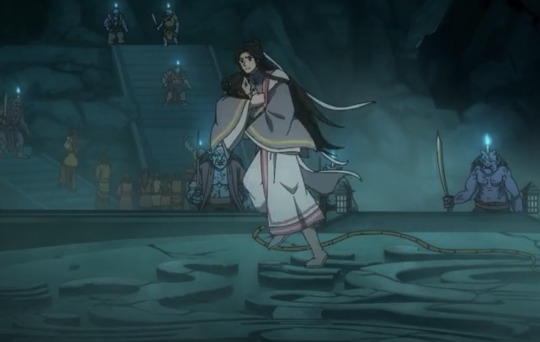
-Parental Xie Lian!
-Dude if I were you I’d keep the kid with me at all times, not that I want to be parent whatsoever
-Move over MCU Loki
-Qi Rong low key has the same pathetic energy as Prince John did in Disney’s Robin Hood
-“And then there’s me. Smiling, as I end your damn life!” Preach Hua Cheng
-Right in front of his own statue
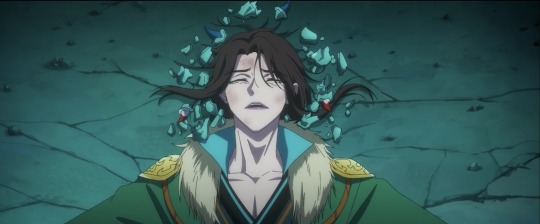
-There goes the Oni Mask
-Ugh purple lipstick and Xie Lian had better cosmetics in S1 EPs 1-3
8 down! 4 Eps left to go!
#my post#my reaction#episode reaction#heaven official's blessing#tian guan ci fu#Tgcf#tgcf season 2#season 2 episode 8#tgcf donghua#Eng dub#xie lian#hua cheng#san lang#hualian#Guzi#qi rong#night touring green lantern#green immor#Xuan ji#xiao ying#lang qianqiu#tai hua#Pei xiu#pei ming#batman the brave and the bold#btbatb#disney robin hood#robin hood 1973#prince john
17 notes
·
View notes
Text
What the magic circles say in Lego Monkie Kid
(U can skip to the end for the tl;dr)
My fiance (skittle) is very good at languages. so last night, they stayed up while i was asleep and decided to rewatch monkie kid (as one does). well, they got to the clone episode and they wanted to know what the magic circle says. this one specifically
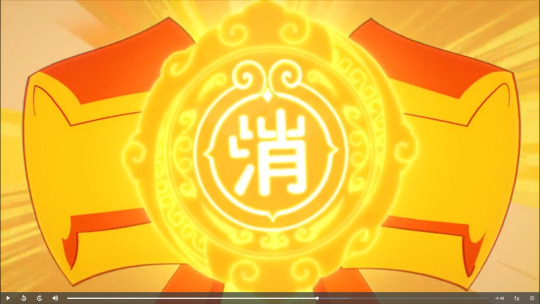
they arent an expert, nor are they fluent, but let me walk you through their process.
Skittle has an apple pencil and an ipad, which means they can write things and the ipad will turn it into text. so at first they tried drawing it onto google search, but it wasnt working. they assumed the area wasnt big enough for the ipad to properly read the Hanzi (the symbol), so they opened their translate app and tried there. each time it kept putting a diferent Hanzi instead.
Skittle wrote it over and over multiple times but never got the same one (for over an hour. they got very upset lmao). so they looked at the spell again and noticed something a bit off about it. if you look back up to the circle, you can see the L shapes in the top left, which isnt something you normally see in handwritten chinese. it looked more 'computer friendly' like a font. so they decided to do everything the same, but change those two marks to diagonal lines (going in the same direction). and they got this!
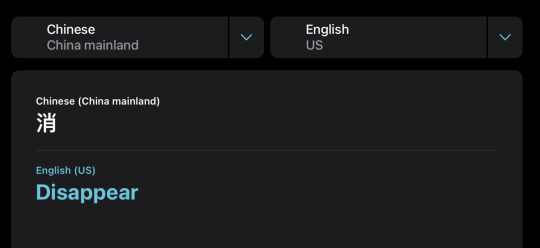
So the spell MK uses in episode 2 translates to "Disappear"
Then skittle remembered the spell Wukong used to seal some of MK's powers. this one
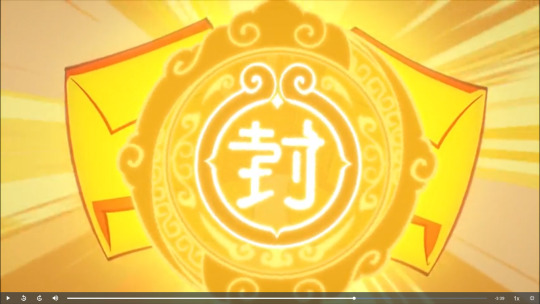
this one was not as easy to figure out
So they followed the steps again, and got this
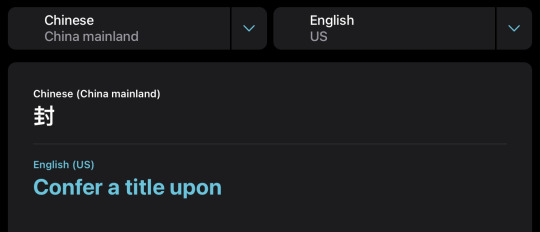
they were obviously confused. because that IS the right Hanzi, but that translation makes no sense, right? so they went to google translate and put in 'confer a title upon' and got this
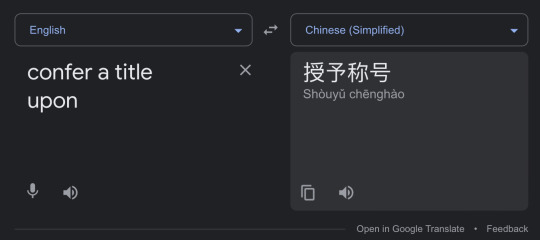
not the same thing at all. It made more sense, seeing as it was multiple words, but then what was the app talking about? so they decided to try putting what would make the most sense for the Hanzi to mean, which was 'seal up'

it was still longer, but the first hanzi was correct. so they pasted it back into google translate and got this!
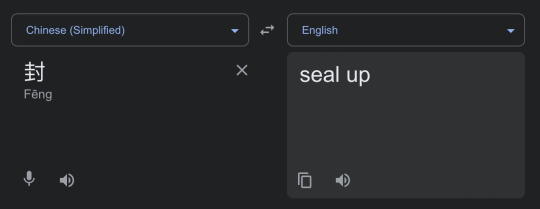
then out of pure curiosity (and because they were half asleep) they pasted it twice into the translator app to see if anything changed

Which it did!
So the spell that Wukong used on MK in episode one roughly translates to 'Seal up.'
Chinese is a very hard language to translate, so im very proud of my fiance <3
(tl;dr the magic circle Wukong uses in episode one roughly translates to "Seal up", and the one MK uses in episode two translates to "Dissappear.")
#lego monkie kid#lmk#lmk sun wukong#lmk mk#lmk monkey king#monkey king#lego monkie kid sun wukong#lego monkie kid wukong#lego monkie kid mk#monkie kid#lego monkie kid monkey king#text post#long post#translation#skittlescripts
376 notes
·
View notes
Text
Hey, guys! Want to vote on the best 6th-10th Century script (writing system) that I, Gecko, personally like?
Of course you do! Writing systems are SO COOL!
And here's a bit about each of the contenders:
Arabic (Naskh Script)
Derived from the Aramaic Script, which grew out of Phoenician, Arabic has a variety of forms. The Naskh script is the one I find the most beautiful, with it's extreme variation on character length and height. I also love the use of multiples colours for Ḥarakāt (vowel marks and other diacritics). Add in the elegant curves and solid lines, and Naskh Script becomes one of the most stylish scripts around.
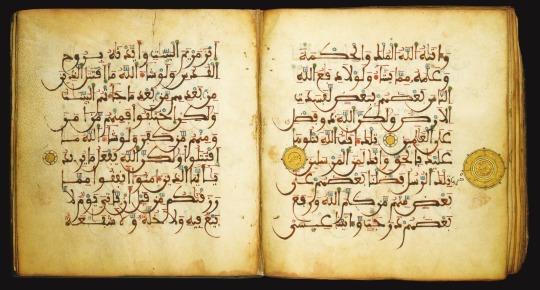
Latin (Insular Script)
Derived from Greek, the Latin alphabet is usually a competent and pleasant mix of lines and curves, uprights and descenders. Insular script plays with these qualities, and the result is electric! many of the uprights (t, d, f) are gone. New descenders are added (r, s, f). Horizontal lines take a new prominence. Line weight is increased, and the curves become more angular. Something old to us becomes new again.

Chinese (Semi-Cursive Script)
There are many ways to write Hanzi (Chinese characters), and Semi-Cursive Script manages to combine the best qualities of most of them! The expressive curves and flow of a cursive script. The solid shapes and readability of Regular Script. One of the joys of Hanzi is the visual interest of so many unique characters; which share components, but use them differently. Semi-Cursive keeps much of that interest, while also providing a dynamic energy and movement.
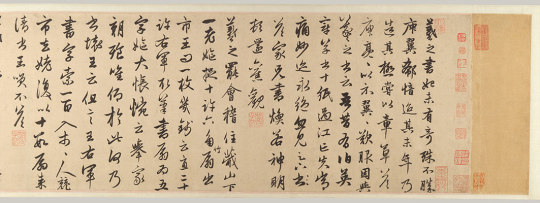
Sogdian (Cursive Script)
Derived from the Syriac script, which grew out of the Aramaic Script, the Sogdian Alphabet was developed by traders who met most of the major cultures of the Old World, and let all of those cultures affect their language and writing. Sogdian can be written write to left, like most Aramaic scripts, but also top to bottom, like the Chinese Scripts of their main trade partner. Curvy cursive lines, and characters of wildly varying length, give this script a interesting sense of flow.
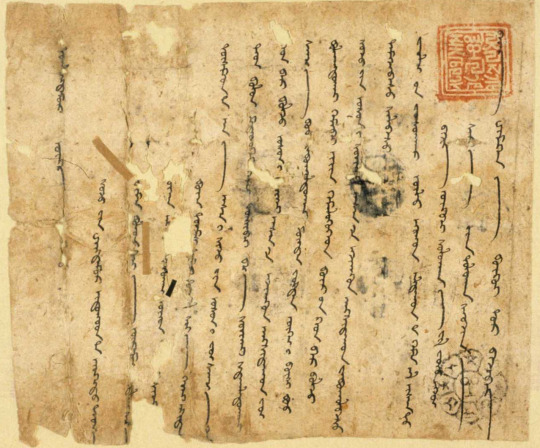
Hebrew (Ktav Ashuri Script with Palestinian Vocalization)
Another offshoot of the (Imperial) Aramaic Script, the Hebrew Alphabet has a really interesting, heavy, square, solid feel. In contrast, Palestinian Voicing (an extinct form of writing vowels where all of them were above the consonants) is really light, stacked on top their vowels in little floaty towers. It's a cool combination!
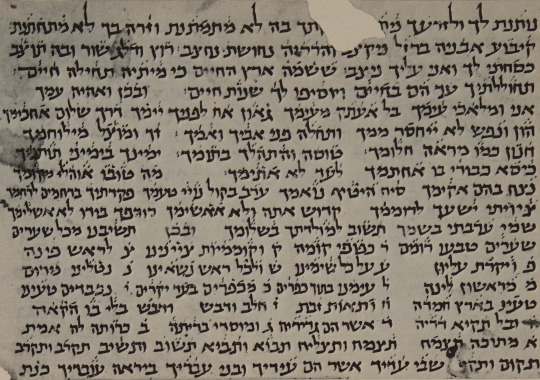
Maya (Classical Maya Script)
The most famous script of the Americas, Maya has one of the most unique reading orders of any script. Characters are written in blocks, which are then read in a zigzag (right, and then down-left) pattern. Full of heads (both animal and human), torches, seeds, and other half-identifiable shapes, Maya texts are works of art, and the more you study them, the more beautiful they become.
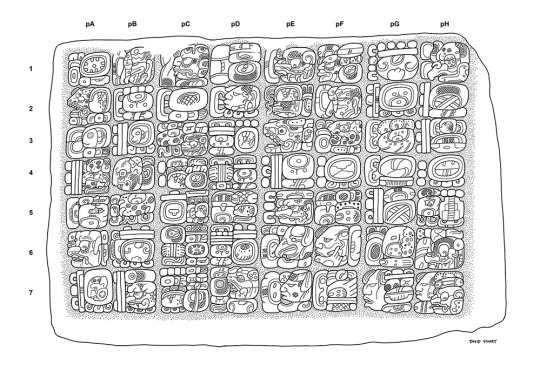
Nubian (Old Nubian Script)
Derived from Greek with additional letters from Coptic (Egyptian) and Meroitic (a previous Nubian culture). Lines above letters are used to skip parts of words deemed unnecessary. The mixture of rectangles and triangles, heavy and light line weights - it reminds me of telegrams, or early typewriter text. I love it!
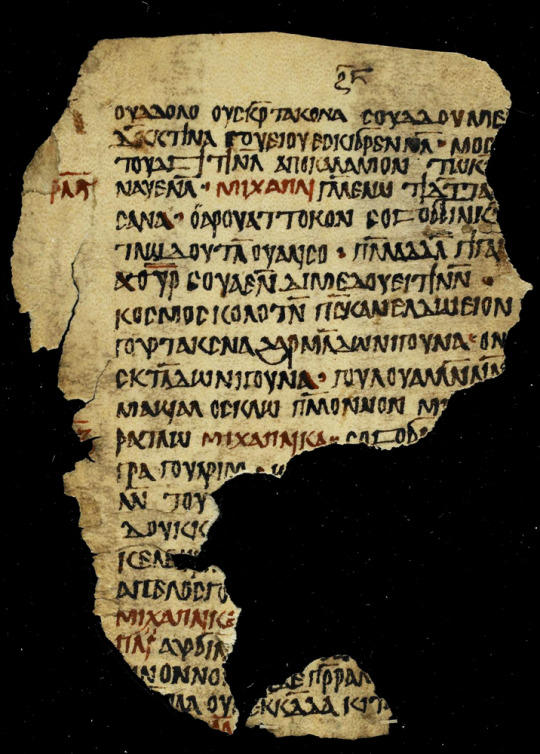
Khmer (Angkorian Khmer Script)
Derived from the Pallava Script, which derived from the Brahmi Script, Khmer is probably my favourite script to write. The curves feel so good! The spirals so pleasing! You write consonant clusters by writing little letters below the main one! A joy to create, and a joy to look at.
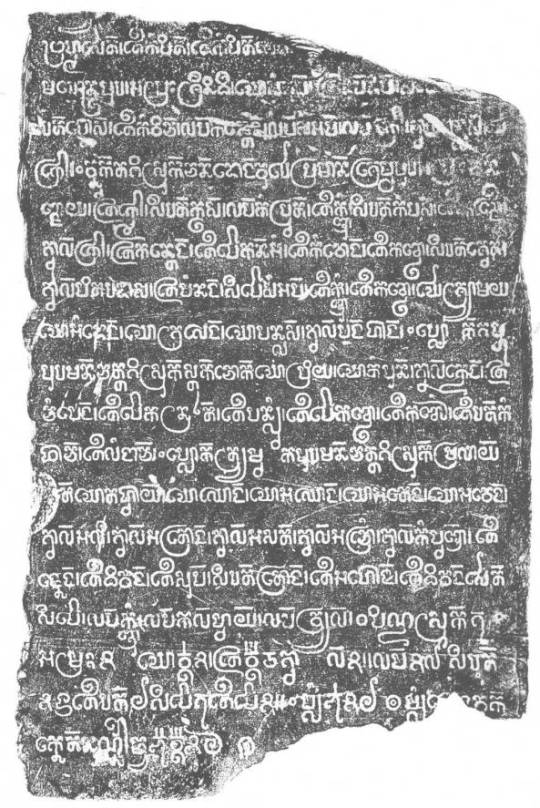
Japanese (Cursive Script)
See these wiggles? They're Chinese characters. Elegant, looking like poetry no matter what they're saying, Cursive Japanese is art. It's also ridiculous. 3 different characters, each with multiple strokes, indicated by wiggling the brush as you draw a line! Most cursive scripts are like this, but the contrast between the square solidness of Regular Script and the flow of Cursive is one of the more extreme. What a delight!
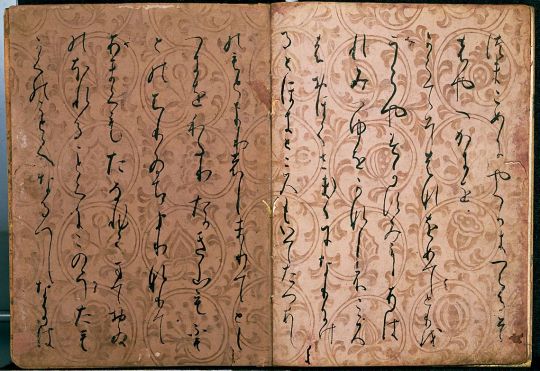
Sanskrit (Siddham Script)
I had SO MANY options for Sanskrit (Brahmi) Scripts, you guys. SO MANY! But in north-west India, during the period I study, this version of Siddham is the prettiest. Look at the curves! Those aren't just decorative, each curvy line that goes above or below the text is a vowel. Consonant clusters are shown by combining the characters together in one spot. The lines at the top haven't yet started connecting, like they do in modern Devanagari, but there's already a sense of it's existence. Such a cool script!
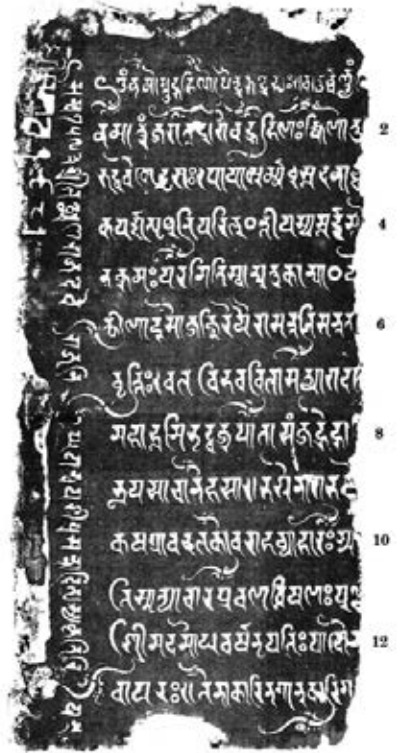
#long post#gecko's polls#calligraphy#scripts#writing systems#arabic#hebrew#khmer#maya#latin#nubian#sanskrit#sogdian#chinese#japanese
231 notes
·
View notes
Note
I've read your 'guide' on how to read faster, but I have a few questions of my own, if you would have the time to answer, please! And thank you, in advance, should you do it.
So sorry if you have answered any of these beforehand.
How many languages do you speak, exactly? I've seen you write in korean, english and french, but I assume there's at least another two? Also- do you have any tips on learning languages faster? I am currently learning french and russian, although they come a little easy to me since my mother tongue in romanian, and I live in a very russian-populated area.
And, what did you study in university, if you attended? I'm assuming something to do with classic literature and/or linguistics?
Thank you again if you've read all this :3 Have a good night, or day!!
Hi, I’d be glad to answer those questions!
How many languages do I speak, actually?
Well, I usually say I’m only functionally bilingual, because I’m only comfortable in French and English. And I’m better at reading and listening than I am speaking (as is the usual situation). I also know Arabic (Jordanian and MSA), on paper, but I’m very out of practice.
I can read and understand most Romance languages thanks to having studied Latin, but I’m best at Italian and Occitan. I know German and Russian pretty well, mostly due to having German- and Russian-speaking friends. I studied Korean for several years, but my knowledge of Chinese is entirely self-taught, and any understanding of Japanese I have is from knowing kanji (as hanzi) and knowing how translation works in general. I studied Ancient Greek for an embarrassingly long time. Technically my first word (‘more’) was in sign language!
Tips on learning languages faster:
This is an impossible question, really, because linguistic comprehension is so inevitably individual. Vocabulary flashcards might work for some people; for others (myself included) they’re useless. The uncomfortable truth about language acquisition is that there’s no ‘secret’ to it, no ‘cheat code’ or ‘one weird trick’ to make it quick and easy. It’s hard, grueling, thankless work. It’s also the best and coolest thing in the world, in my opinion, but it’s not something that can be ‘hacked.’ That said, here are some things that have helped me.
Study the linguistics and grammar of your target language’s family. Knowing how to construct a sentence will be much more useful than having a wide vocabulary; you can always talk around a specific word (‘you know, that thing that you use for doing this?’ etc.), but if you don’t know how to ask for clarification, you’re screwed.
Do as much total immersion as possible. Spending time around normal people who are normally speaking your TL will do more to improve your comprehension than almost anything. Make like a little baby who doesn’t know anything.
Read a dictionary in your TL. This will help flip the switch from mentally ‘translating’ (SL -> TL) everything to defining terms in the TL: e.g., instead of thinking of ‘cauchemar’ as ‘coșmar’ but in French, think of ‘cauchemar’ as ‘rêve pénible dont l’élément dominant est l’angoisse’ (for example).
Listen to music in your TL. Any media will be helpful (movies, TV, radio, podcasts, etc.), but music works the best. Listening to an album or podcast while you sleep is good, if you’re the kind of person who does that. (Personal anecdote: I remember one time when I had a dream entirely in Korean, including with words that I didn’t consciously know, and then when I woke up I just knew those words. Human consciousness is weird.)
Keep in mind that your brain can only absorb and process new information at a certain pace; trying to force it to go faster is only going to slow it down. If I could impart one single piece of advice on aspiring polyglots, it would be to spend as much time as possible immersing yourself in your target language, both listening and speaking.
In general, however, as I said, there isn’t really a way to ‘skip the queue’ when it comes to learning a language. Anyone who says otherwise is selling something.
What I studied in university:
I studied a very generic ‘classics’ degree, but my specific area of expertise was ‘Euripidean and later interpretations of Homeric canon’ (to paraphrase a very elaborate dissertation title). Functionally this meant that I read a lot of Euripides and Homer and complained about how different scholars throughout history have misinterpreted their corpora. I also did a lot of courses on translation studies. Often it surprises people to learn that I never specifically studied literature or creative writing; I come by that naturally (reading ridiculous amounts of books whenever possible).
Hopefully this all has been at least somewhat helpful/informative, and as always let me know if you have any other questions!
#asks#pacatosuldeahile#talking about books and stuff#I wish I knew more Romanian... it’s such a beautiful language!!#French and Russian make a good pair because Russian was highly influenced by French (as the ‘language of the elite’)#if you know any Greek it’ll also come in handy for learning Russian
7 notes
·
View notes
Text
'lazy' study activities
Yes, this is an extension of the big monster 'study plan' post I am working on. The big study plan post will link more tools and articles to use, this is more like a short suggestion of study activities you could try.
(Scroll to the bottom to see the SUMMARY)
If you already watch cdramas, continue to do so. Download Google Translate app on your phone (and Pleco, and any other translation app you like). Watch cdramas that have hard chinese subtitles on the videos - many youtube cdramas already are like this (you see chinese hanzi subs on the videos). Keep watching with english subtitles on too. Every 3-5 minutes, look up a word or phrase you're curious about. Google Translate allows you to type in words or phrases with pinyin, so if you see 小心 or 你放心 or 他死了 in the cdrama, you can type what you hear 'xiaoxin' or 'nifangxin' or 'tasile' to get the translation. If you don't hear the pronunciation clearly, or don't know pinyin letters-pronunciation well, then you can also do writing input and write in the hanzi you see on the hard chinese subtitles. I'm left handed and didn't know the stroke order as a beginner, my handwriting is usually incomprehensible to writing recognition software, and google translate still usually figured out which hanzi I was writing. So yeah, just watch what you'd normally watch and look up a word/phrase every 3-5 minutes as curious. This activity will ADD up. In a few months you might know a lot of words. If you are a beginner, maybe start with this activity and just keep doing it for a while. Eventually you'll start to pick up dozens of words, maybe even a few hundred. You'll probably eventually get curious about what grammar you're looking at, how to parse the sentences, how to remember hanzi better, and you can use that curiosity as motivation to push you to do some of the more 'intensive' study activities like learning about hanzi and grammar.
Not the laziest activity, because it does require reading an education material: but all you have to do is read it. You don't need to memorize, or study intensely, just read leisurely through it once. Read this dong-chinese pinyin guide, when you have decided you're a bit annoyed you can't figure out the pinyin to type the words you're trying to look up in cdramas. Or read it when you're eager to try typing with a chinese phone keyboard so you can type in hanzi instead of using writing-input, since typing the correct hanzi will make looking up new words easier. (To type hanzi you just type the pinyin, then pick from the hanzi suggested). Reading through this will take as little as 15 minutes, to as long as several days if you're just reading 1 section of it a day in 3-5 minutes. If you enjoy re-reading and reviewing, you might spend a few hours total on this pinyin guide. But if you're lazy? Just read through once, and know you can always come reference it again later if you're confused and want to clarify something. If you plan to learn zhuyin, you can check out the zhuyin guide at the top-right tab of the linked page.
Also not the laziest activity on here, as it will require reading educational material for 20 minutes to 2 hours depending on your reading speed and if you split it into different days and if you personally enjoy reviewing or not. Again, just read through these once when you have a few free minutes to spare. If you're a beginner, you'll appreciate the basic information about hanzi and how they work.
Part 1: Chinese characters in a nutshell
Part 2: Basic characters and character components
Part 3: Compound characters
Part 4: Learning and remembering compound characters
Part 5: Making sense of Chinese words
Part 6: Learning and remembering compound words
If you are a beginner and don't know much about tones, you may also want to spend 20 minutes to 2 hours on some days/weeks you have free on these informational things on tones:
Four Tones Explanation (great explanation video)
Tone Combination Practice (with some useful notes in it)
When Do Chinese Tones Change (good explanation, helpful 3rd tone explanation)
Accent Lab Mandarin Tone Pairs (I recommend this tool for listening practice, and later in your study to check on increasing your listening skills)
And finally, 2 textbook explanations of tones that I've found useful here and here.
Learning new words: if you find the pace of learning slow from just shows, are getting eager to learn more words FASTER so you can understand more? There's a few options.
There's SRS apps like Anki (or Pleco app's flashcard area), and if you enjoy flashcards or can focus on flashcards better than me, then if you do SRS apps 15-30 minutes a day the studying WILL add up. I cannot focus on such apps though, and once my focus burns out it takes me 1 hour to study 5 words... when for most people, they take 5 minutes to study 20 words or more in these apps.
If you're like me and can't focus long term on doing something like flashcards. Option 1: you can still use an SRS app like anki. Just cram 'new words/sentences' ONLY for a few days or weeks (so when you can get through as many words as other people you try to get through as many words as you can in 30 minutes to 2 hours), and when you start to feel the focus fade then switch to only review cards (and only New review cards until you've reviewed everything once). Quit reviewing when the focus is totally gone. You may finish reviewing everything, or you may not. Doesn't really matter. The initial 'new words/sentence' cards were to get an initial exposure of this means X, just like watching shows gives you that initial exposure the first time you look up an unknown word. You will 'review' these words more by seeing them in cdramas and other things, especially when you're still a beginner who needs to learn a few thousand common words. Option 2: same activity, but use a word list (or word list with sentence examples) online or printed on paper. Read through the list once over a matter of days until focus fades, then try to read through the list a second time (review) until focus is lost.
Option 3: Audio flashcards my beloved. If you REALLY do not want to look at flashcards for 15-30 minutes a day, or like me you REALLY can't focus at all on flashcards sometimes (because if 5 minutes take an hour to study like for me it's not very time effective ToT), audio lessons and audio flashcards will be your friend as a beginner. If efficiency is not your highest priority, I suggest you go to the Hoopla or Libby library apps, and looking up 'chinese lessons' or 'learn chinese' and try out some of the audiobooks and audio courses. Also go on Spotify and look up 'learn chinese' and try out some of the podcasts (I used to listen to Coffee Break Chinese), look up lessons on youtube (and things like "chinese sentences english translation"). ANY lesson that speaks chinese sentences, then speaks the english translation? Perfect, you can use it. Anything that tells you the chinese, then the english translation, is making sure you understand the chinese being used enough to start learning it. If you want to be particularly efficient with your time, you'll want to prioritize listening to audio that has MANY new chinese words per lesson. I listened to the chinese spoonfed anki audio files, chinese/english sentence audio, with new words or grammar in every sentence, but also a lot of words re-used in new sentences so i'd get some 'review' of words I'd heard before even if I only listened to new audio files until I finished. Those audio files have ~7000 sentences and probably a bit less words but still thousands. Immersive Languages (library audio lessons you can use) and Chinesepod101 would probably also have fairly information dense lessons.
Why are audio lessons and audio flashcards lazy? Well, particularly when it's just english/chinese sentence audio, you can listen to it while doing your regular daily schedule. Fit 30 minutes or even hours of listening a day, into when you're driving, commuting, walking, cleaning, cooking, grinding in video games, exercising, doing busy work you can listen to something in the background during. I tested this by doing it myself, and even if you are not paying full attention and just in-out of listening in the background, you will learn new words. So listening in the background while you play video games you would anyway? Easier, versus trying to focus on flashcards (very hard for me lol)? As far as 'intentional study' of educational materials, listening to audio lessons and audio flashcards is the easiest to do while continuing your regular daily schedule (aka not needing to carve out extra study time). The main drawback is it is very listening focused, so if you aren't working on reading skills with cdrama subtitles, graded readers, or webnovels eventually, then your reading skills will fall behind.
As an extension to the 'listening is easy to add to a daily schedule' idea: if you are an upper beginner, you can listen to learner podcasts entirely in chinese or graded reader audiobooks. If you're an intermediate learner, you can listen to audiobooks of webnovels you've read, or listen to audio dramas of stuff you've read subtitles for before, or if it's comprehensible enough for you then just listen to new audiobooks and audio dramas. You can listen to cdramas you've watched before playing in the background, or condensed audio (audio of shows with the silence cut out). Not only that, but when it comes to stuff like this, where you know SOME words but not all words? Or where you can read the words, but can't understand them when listening? Re-listen to the audio a LOT. I'm talking 10-20 times, or at least 5 times. Play chapter 1 of an audiobook on loop in the background while you clean your room, or while you level grind in a video game, or while you mull through doing a spreadsheet or lifting boxes at work (if you can work fine while listening to audio), or while you commute. You will, genuinely, notice your comprehension improving the more you re-listen even if you only paid half attention and didn't follow the plot the first few times. It is one of the easiest study activities to do, once you're at the point you can listen to audio materials. Just keep re-listening until you're bored and want to pick another, or until you feel you've understood as much as you can in that audio file (although I bet you if you've listened 5 times and think 'that's all I'll understand,' if you let yourself listen 10 times you'll be surprised how much MORE you end up understanding by then).
If you're getting ansty (as a beginner) about not understanding the grammar of the sentences you see in cdrama. Use that as motivation to spend 5 minutes to 30 minutes a day (or if you enjoy reading just read for 4 hours one day and be done) to read through some chinese grammar guides. You can either look up "basic chinese grammar" and read a few articles, or find a chinese grammar guide and just work your way through reading it. I personally suggest that, if you're bored by it or unable to focus: either JUST read the grammar point TITLES and then read more into the topics you've been seeing in cdramas that you want to learn more about. Or you just read HSK 1-4 grammar points, since they're the basics. Or you skip to the 'grammar point example' and read the examples to get a visual of what's going on. Or only look up specific grammar points as you watch cdramas, if something seems confusing.
I personally felt... it was easier in the long run, for me, to just read a whole grammar guide as a beginner. Did I understand everything? NOPE. I didn't understand like 2/3 at all. But skimming through an entire grammar guide made me aware of all the ways to expect past tense: 去 过 过了 了 以前 etc, ways to expect the future and ability and desire 会 要, how to ask yes/no questions 吗 and suggestions 吧, 有 没有 i have/dont have and how have can be used to express past tense things, 不 don't/not, how 的 地 can make descriptive phrases (地 is like english -ly) (and how in chinese a sentence clause-的 usually goes in FRONT instead of in the middle like in english), how 得 is both 'must' and also has several grammatical functions to look out for (that I didn't get used to until I read a lot to be honest), and 着 has grammatical uses too (the first of which was it seemed similar to the english verb ending -ing to me). These were basic things, and a lot of their more particular aspects went over my head.
But knowing roughly how to pick out 'that's a verb' and 'that's probably a descriptive' and 'that's a clause' and 'that's negative' and 'that's past tense' or 'that's present or future tense' helped me start guessing the overall main idea of sentences and paragraphs WAY sooner than it otherwise would have took me. If I'd only looked up 1 grammar point occassionally... it could've taken years to recognize these basics. Instead it took a month of reading a grammar guide, then several months of seeing that grammar in cdramas and webnovels just to fully recognize what I saw. I did still look up a particular grammar point when confused, but usually I already was vaguely familiar with the grammar point to look it up (like seeing 把 in the sentence and knowing THAT is what i should look up because it's confusing me). So yeah: feel free to do it the way you prefer, as we all will have different preferences and things that work better for us. But for me, it was worth just reading 4 hours of a grammar guide in 15ish minute chunks over the course of a month.
Unfortunately the grammar guide summary i read (chinese-grammar.org) no longer exists. So I will link some options I've found, but if you find more concise and simpler grammar guides please share them! Introduction to Basic Chinese Grammar. AllSetLearning Chinese Grammar Wiki (way too long to read easily in my opinion but I used this to look up specific grammar points later in learning a Lot), Basic Patterns of Chinese Grammar: A Student's Guide to Correct Structures and Common Errors (this one is a print book but the only modern book I bought for grammar), and Wikipedia's Chinese Grammar Page (which is the grammar guide I'm currently reading through to consider as a resource - i think as far as summarized it may be one of the shorter options).
Whenever you feel ready to learn hanzi? Honestly the sky is the limit on options. If you like SRS apps like anki, Skritter is an app I've seen recommended for hanzi, I used some "chinese hanzi with mnemonics" anki decks (while I could focus lol). I personally found the easiest way for me to start was to just read through this book (which is for free as an ebook in many libraries/library apps, and can be found in free download book sites):Learning Chinese Characters: (HSK Levels 1-3) A Revolutionary New Way to Learn the 800 Most Basic Chinese Characters; Includes All Characters for the AP & HSK 1-3 Exams. I liked this book because it made up a story to help me remember meaning, pronunciation, and tone. Along with providing example words. It's only 800 hanzi, and all I did to study it was read a few pages every couple days until I finished it - it took me around 3 months to finish the book. I didn't review (though you can re-read and review if you enjoy that).
But the mnemonics really helped form that 'initial recognition' memory and so when I started reading graded readers (once I'd studied 300 hanzi in the book), the graded readers helped 'review' those new hanzi and I learned them fast. For the 1000 hanzi I learned on my own after this book, I utilized the mnemonic story strategy that this book taught, and it was fairly doable to just keep picking up hanzi by looking them up when reading, coming up with a mnemonic story in my head, then moving on. As I kept seeing hanzi again, I'd eventually remember them. (And they say it takes 12-20 times of seeing a word to remember it, so at worst that's how much I was looking up new words... sometimes only 1-2 times though).
I would suggest that if you don't use SRS apps like anki or Skritter for hanzi, use some tool with mnemonics like a hanzi book with mnemonic stories (like the one I linked or a few others that exist). And when you look up new words in cdramas, and later graded readers and webnovels, please listen to the word's pronunciation a few times. So you're getting a bit of initial recognition of the hanzi's components/visual AND the word's pronunciation. If it takes 20 times or less to learn new words, then you'll want to get that much reading AND listening exposure.
When you have some basic grammar knowledge (or if you're really tolerant of ambiguity), keep watching cdramas as you have been. But try to pause the show every 3-5 minutes and read a chinese subtitle sentence. You can use the english subtitles to try and parse the chinese word meanings, or look up keywords using your translation app, whatever you want. Since a LOT of cdramas have chinese subs, and you watch with english subs, you can utilize these dual subtitles to start practicing reading skills and practicing guessing new words from context (in this case the context is the scene, the chinese words you already know, and the english translation). Later in your studies, when you stop using english subtitles sometimes, this will have been good practice of getting used to trying to read chinese. This pausing every 3-5 minutes to try and understand a chinese sentence should not take much time, maybe adding 5-10 minutes of watch time to a cdrama episode (depending on how long you pause). So it should be fairly easy to work into your schedule.
So yeah. The big summary of all this is:
If you want to make progress at a pace most people are going to find not too slow, I suggest 1-2 hours on average of doing stuff with chinese a day. (Or more hours a day on average if you want to get through the beginner phase faster). It'll take thousands of hours to learn chinese. Your pace will be extremely slow if you do less than 1 hour with chinese a day on average.
If you already watch cdramas, then keep doing that and just start looking up words (and eventually trying to figure out some sentences) once every 3-5 minutes as curious.
Spend 5 minutes a day reading articles on chinese writing system, and pinyin, and basic grammar, for a few months. You don't need to memorize or review, just get a basic initial exposure.
Approach other educational materials that way: if and when you start more 'intensively' studying, you can just get an initial exposure to the ideas (like a hanzi book, a grammar guide, reading word or sentence lists if you like to do that). You don't need to memorize or review, you don't need to understand everything. Just get an initial impression. (If you enjoy memorizing or studying though, go wild lol)
Audio lessons and audio flashcard study materials will require no time to fit into your schedule, you can do those while you do daily activities that you can listen to audio while doing. As an intermediate learner, these can also be used the way extensive reading is used - to pick up more vocabulary, improve grammar understanding, improve comprehension speed.
New words take (lets rough estimate) 20 times of seeing to remember. So you'll be looking up new words up to that many times when watching cdramas, or later when reading, and that's okay. It'll take a while to fully solidify this new information and you can just keep watching cdramas and doing things in chinese, and the information will eventually be learned. Especially as a beginner: you'll run into the few thousand most common words CONSTANTLY, you will eventually learn them as you keep looking words up and doing stuff in chinese. You do not need to do any special scheduled review (like SRS anki cards, skritter, pleco flashcards) unless you personally enjoy doing it, or want to speed up your progress and are okay with carving 15-30 minutes of time specifically for doing that.
The process of transitioning to graded readers, cdramas with no english subs, and webnovels is it's own beast - which I can cover if you want (and will in the bigger post's step 3). But the short of it is: if you keep doing activities until you've learned around 1000 words, you should be able to start reading easy graded readers and gradually increasing their unique word count until you're reading graded readers with 1000+ unique words. (And you can start graded readers knowing only 200 words if you want! Mandarin Companion has books for beginners if like me you'd like to practice reading ASAP). At that point, you should be able to transition to easy webnovels (using Pleco Reader/Clipobard Reader, Mandarinspot.com annotation, Readibu app, or highlighting and right clicking and using google translate in a webpage) and to watching cdramas you've seen before or with simple plots in chinese only. How many words you look up, or if you look up zero, is all fine: as long as you grasp the main idea of the plot. If you look words up, and can grasp at least the main idea? Then you can watch/read as long as you look words up (and you'll learn the other detail words from context) If you can grasp the main idea without looking any words up? Then you can watch/read without looking words up (and learn new words from context). The first few months (or even year) of transitioning to webnovels and cdramas with no english subs will feel hard, even if you know all/most of the words. It's just part of adjusting to actually comprehending all the things you've studied. I suggest following Heavenly Path's Reading Guide as soon as you're ready to start trying to read - first graded reading material, then webnovels once you've learned around 1000 words.
#rant#study plan#chinese study plan#study activities#langblr#studyblr#firstly please just SKIP to the Summary at the bottom first#you know i ramble ToT#second - these activities can be applied to any language you're studying#my study plan at the moment is super similar for japanese#i listen to japanese audio flashcards while i work or drive. and then look up a word im curious about here and there while watching jdramas#or while playing japanese video games like Yakuza. that's all i really do for study of japanese rn.#sometimes i pause yakuza (or think really fast lol) and try to work out#a sentence or phrase meaning based on the japanese i know and english subtitles#but it still adds up! my little time tracker says ive been spending like 1.5 hours on japanese a day#my chinese study plan rn if youre curious: listen to audiobook or audio drama for 1-3 hours. and read for 15 minutes if i feel like it#thats it. ALL audio study is done when im working (and it plays in background) or walking or driving
13 notes
·
View notes
Text
做工前肯定要讲几句有关249的事: 憂太的 领域展开
// I Must Talk About c249 Before I Work: On Yuta's Domain Expansion
This post contains spoilers for Chapter 249 of Jujutsu Kaisen.
If I don't dump it here, these thoughts will distract me later! I'm already very distracted lately! Too distracted for my own good! Ahhhhh!
First off, I was eating so good. Yuta fans, simps, appreciators, and Rika (good taste, y'all)—rejoice, for this chapter is basically 95% Yuta! That's right; the next 5% was Yuta's Eyebags!
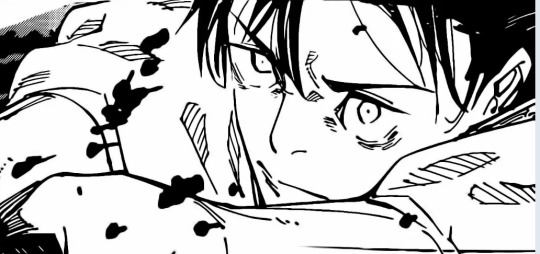
Look at this! He's so cute! So handsome!
Oh, I have to learn to exorcise spirits now. Then I can kick that fake Rika away and become his Rika!


Also, some people are somehow even more handsome just by being shown slow breathing. Is it just me who thinks that? Or is this what "rizz" truly means? I mean, look at that slight frown! Look at those eyebags! Look at him breathing!

... I'm sorry. I'm usually not one to write something with such trifling, substanceless content.
It's just... Yuta, man.
Anyway, the main point. Please, look at Yuta's
Domain Expansion
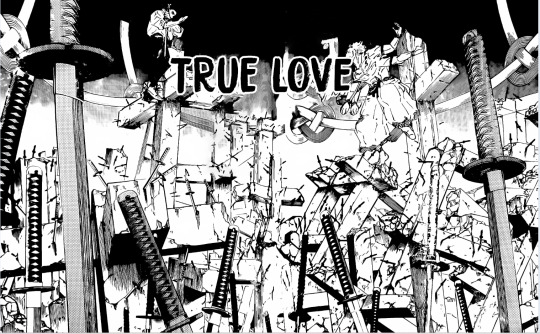
Shit is so magnificent. The many swords are obviously the first thing one would notice (and all that joke about Unlimited Blade Works and that Bleach... thing), but it's the abundance of crosses and the knots behind them that attracted my attention.
I'll get the easy out of the way first.
The Crosses
I would suspect these are meant to be "gravestones." Not too hard to think of "till death do us part," right? Though, to be fair, death didn't do Yuta and Rika part. In fact, it strengthened Yuta's split-moment craving for Rika and cursed her—in true dukkha fashion—into something quite macabre.
If one's Domain is the extension of their mental-scape, then it makes sense that Yuta's would incorporate gravestones, since his genesis as a cursed energy user effectively began on the day Rika died.
----
The Knots
Now this is the part that attracted the most of my attention!
Japanese knot-tying traditions are largely influenced by Chinese knotting (中国结) [1]. The word for knots in Chinese, 结, means "to bind," which then comes to represent all kinds of "union." Marriage, for example, is 结婚 (hanzi) /結婚 (kanji) [2][3]. Given Yuta's "love" motif, you can already see why the knots are part of his Domain.
There are plenty of meanings for the word 结, inter alia, it's a pun on 吉 (blessed) [2][3]. The fact that these knots are intertwined also comes to represent "interdependence," "connection," and "bonds." [2]
It's a bit of a stretch, admittedly, but I suppose one could probably draw this to that time Yuta described himself as "blessed." He is blessed because he was loved—he is enriched by connections and bonds with other people.
-
What is the knot type in Yuta's domain, then?
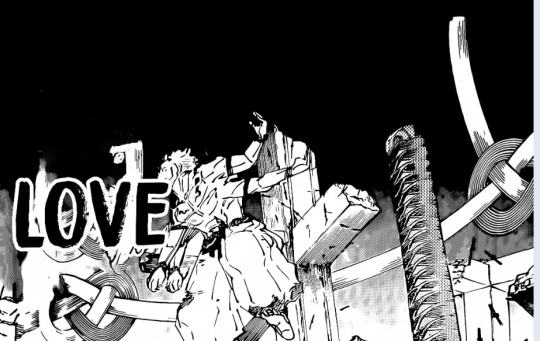
There are two candidates I could find.
I always rank each possibility from the highest confidence level to the lowest, so here goes. Note that I'm using the Chinese name (I would love it if someone added a more Japanese-focused viewpoint in this post on a reblog. I'm much more familiar with Chinese and cannot read Japanese, so...):
(1) 双钱结, The Double Coin Knot, 淡路結び [1]
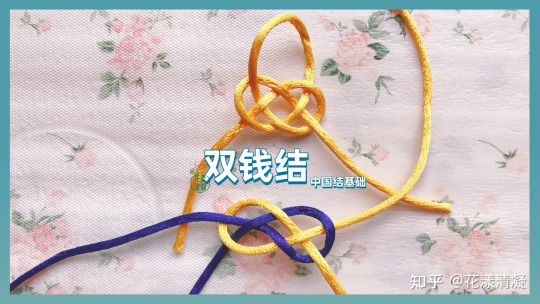
It's shaped like two copper coins that are intertwined, hence its blessing is largely related to fortune and money [2][4].
However, the pronunciation of 钱 ("money") is similar to 全, "whole." Meanwhile, there is a pair of coins in this knot. This gives 双钱 an alternative reading—双全, "a pair that makes the whole." It also means 好事成双, "good things come in pairs." [4][5]
Yuta, as a jujutsu sorcerer, is more of a pair than an individual—he fights with Rika and is connected to her. These two together make a whole. A force of good that comes in a pair.
Due to sturdy enough sources corroborating the meaning of this knot, the similarity in appearance to Yuta's Knot, as well as the very fitting "pair + whole" symbolism, I have a higher confidence in this knot being the one in Yuta's Domain.
(2) 八字结, The “Figure 8” Knot

It's a pretty dime-a-dozen knot where the number 8 is formed. It has pragmatic purposes (eg. rock climbing), but here, because these two loops are intertwined, it apparently means "honest love" and "unchanging friendship." [6]
I rank this knot as lower in confidence level. It does at least pertain to the motif of love, according to one source, but it doesn't resemble Yuta's knot quite as well as the Double Coin Knot.
A bit of a caveat, in the spirit of intellectual honesty and rigor: The meaning of this knot has been found in only one source (see Citation #6), and it doesn't actually pass my internal rigor test. I've tried to search for corroboration from Chinese sources, but no dice. The only site in Chinese that corroborates the meaning of "eternal love" has busted web certificates and links.
----
The Name of Yuta's Domain Expansion
The translated name by OP Scan is terrible. It certainly pays homage to Yuta's fame (infamy?) as "The War God of Pure Love," but the actual kanji is 真贋相愛。
真 - Truth or real
贋 - False or fake
相愛 - mutual love, or reciprocal love, or "in love."
真贋 literally means "truth and false. Together it usually means "veracity." Here though? I'd interpret it as "The (Mutual) Love Between The Real and The False."
Isn't this shit metal as fuck? I mean, it's also fucking poetry. Truly the kind of magnificence only one with premium quality eyebags could provide!
It's worth nothing that 真贋 itself makes a contrasting pair, which again, links back to the Double Coin Knot's meaning.
I'm sure yall can make your own interpretation of what 真贋相愛 could symbolize vis-a-vis Yuta and Rika. Let's go, people!
----
Tangents to My Research - Side Dish
Knots have come to be a very important symbol of relationships, especially love, since the Tang and Song Dynasty [1]. To draw to the Japanese side of the practice, Chinese knotting practice reaches Japan during the Tang Dynasty as well [1]. It's not too surprising that this love connotation could also have been passed to Japan.
The entangling property of knots also comes to mind the term "连理(枝)", which means "interlocking (tree branches)." Here are two poems referring to the word:
(1) 同心结缕带,连理织成衣. —By Luo Binwang (骆宾王)
We tie this ribbon into a concentric knot, and we turn our interlocking branches (of love)into our clothes. Translation mine.
(2) 在天愿作比翼鸟,在地愿为连理枝 —By Bai Juyi (白居易)
In heaven, I want to become a Biyi Bird (with you). On earth, I want to be (a mesh of) interlocking branches (with you). Translation mine.
The Biyi Bird is a mythological bird recorded in the purely fantastical geographical treatise, The Classics of the Mountain and Seas (《山海经》). The bird is born with only one eye and one wing on one side. To fly, it needs a partner with the other eye and wing of the other side—and the two will fly together as a complement. [7]
It's very lovey-dovey and romantic and shit.
...Damn, Yuta is really all about love and connection, isn't he?
----
Wow, I didn't work on my actual job at all. Because I deadass spend hours just on this. Seriously?
But then again, there has been a precedence to me breaking my lackadaisical attitude toward writing JJK-related things—and that is when it concerns my favorite character. You don't need to click on the link to know who that other one is; it was Gojo Satoru.
Yuta, bless his rizz, deserves all of my time. If he dies (NO FUCKING WAY, GEGE!!!), then at least I have made something of worth about him.
Thank you for reading my ramble!
---- ----- ------
Citations:
"Chinese knotting" from Wikipedia
"中国结的历史来历和寓意" ("The history and meaning of the Chinese knotting") from 妍妍旅行记 on Sohu.com (in Chinese)
"Chinese Knots, Winding the Best Wishes with Cords" by Beijing Tourism
"双钱结寓意和象征,双钱结编法" ("The meaning and symbolism of the Double Coin Knot; How to Make a Double Coin Knot") on 结艺网 www.zhongguojie.org (in Chinese)
双色绳的编法有哪些?("Whast are the ways to make knots using two different colors?") on Zhihu (in Chinese)
"19 Popular Types of Chinese Knots and Their Meanings" on AnyofChina
"比翼鸟" from Wikipedia (in Chinese; English page not created)
There are also other links embedded in the ramble; these are references for that one specific instance and so do not warrant their inclusion under this section.
#jjk#jujutsu kaisen#jjk meta#yuta okkotsu#jujutsu kaisen manga#jujutsu kaisen meta#jjk 249#jjk yuta#domain expansion
15 notes
·
View notes
Text
Long overdue final ebg post (lmao) bc I need to get this out of my system...
Tag for all the posts/storyline

Art by the amazing lovely precious cutie Aine @/ainescribe
First of all I want to thank @i23kazu immensely for allowing me to participate pls I was SO unsure at first haha and she absolutely killed it with the interactions, the lil side project, the prompts, the scores tally... it's just so much work, kudos to you Ying fr!! It was a super fun game.
Shoutout to my besties/mutuals
@silentmoths @ainescribe thank you for your lil asks I love seeing your characters aaaaaaaa 💕
@floraldresvi @moraxsthrone and all the anons I got, your sabotages here and in discord were brutal omg Vi you almost made my cry //pos bc I wanted to react/respond to Li's messages 🥺 EVERY SINGLE TIME ghgnhgnghgn and NOT KEL MAKING MY GIRL HAVE A WET DREAM/SPICY MEMORY TYVM 💕 the way I had to contain myself hELP I loved it svcgavscgvsjgacbkackl
@meimeimeirin you also sabotaged me a lot, meanie //pos I loved SO MUCH your asks/little stories aaaaaa thank you for engaging so much when I know you're super busy 🥺 it def made my day everytime, ty for bringing the girl home and solving my silly lil mystery hehe 💕
@kurikurikurisu GIIIIIRL it's so funny to me that we kinda started interacting more on the last ebg for Rin and then I was like "she's a cool person I wanna fren.... 👉🏻👈🏻 but I shy...." took my sweet time to invite you to the server and turns out THIS ebg got us closer (I think? ehe?//hit) we didn't interact much in tumblr with each other's plots but bOY were we emotional support in discord, we really were in this suffering together 🤝🏻 mhm //nods nods 🤣 thank you so much for being interested in my lil silly plot and my girl aaaaaa
As for the "plot" and other things... (this got so long I am so sorryy;;;)
Well at first I wanted to do kinda a normal ebg, no plot or anything bc I don't think I have the smarts to do an elaborate game/story lmao and I kinda wanted to have more established s/i lore?? And then I realized hey I can use the ebg to introduce my s/i!!!
See I'd been working SO hard on her names lately, researching and studying in-game adepti lore and stuff and I though why don't I make it a simple game where the goal is to guess her name (with me giving hints ofc) and at the very start I had the idea of her losing her memories so she could re-discover/remember things about herself alongside the "players" learning them. Whoever character I got as my bias would help her and get to know her too along the way, even npcs (or in the rare case of me getting Dottore/Pantalone, probs be the villain for her memory loss lmao)
And then I got Kazuha. And it was so SO perfect. I took inspiration from Spirited Away with the plot point of having your name/memories/identity stolen and for some reason I remembered the whole Ino-shika-cho koi-koi card combo from Summer Wars I just had this vivid mental image of a scene where Kazuha dropped the biggest hint by writing the Kanji for Butterfly (Chō) which doubles ofc as the Hanzi for Butterfly/Crystalfly (Dié) written the same pronounced (and romanized) differently :3c
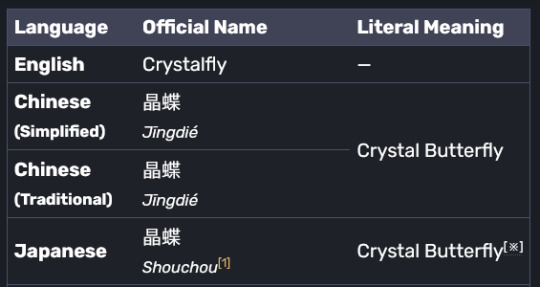

I was very proud of myself//hit also

I did not end up making haiku bc they are complicated but I at least tried to loosely keep/emulate the 3 phrases, phonetic rhyme and sensory elements while referencing my lil plot lmao
✧˖Originally I was gonna blame it on a playful tanuki or smth but I don't think they're powerful enough youkai lmao it was probably a kitsune.... we may never know ✧˖She was technically never in any danger yeah but imagine being lost with no memories and no way to know if you could get them back even because every person she met kept telling her they didn't know ofc she'd break down, or at least me, I'm very crybaby and neurotic sometimes//HIT ✧˖Yes this entire thing was technically Zhongli's fault since he did write her a letter addressed 亲爱的晶蝶 ("My dear Crystalfly/Jingdie") and that IS her name woops on a random note I kinda imagine he also signs with something like 你的龙 "Your Dragon" and vice versa with Crys ("My dear Dragon/your Crystalfly") sgcvgajsvcjhacbajkca //squeals kicks feets
And all this started because I was stressing over the fact that "Crys" is not an appropriate name for a Liyue character lmao, I debated for so long giving her a chinese name, but I didn't want to further make her an OC I wanted her to represent me/my blog (also part of me was and still is immensely worried I somehow insult cn ppl by being as some sort of weeabo equivalent or that I am "appropriating culture" or idk I may be dumb but I try to do my research and I prommy it does not come from a place of malice or anything I genuinely love genshin and Li and it's got me interested in a culture/country I funnily enough have somehow interacted with and have friends in but never really paid that much attention to ig...) and then I just had the epiphany What if I just reverse engineer and name her Crystalfly in cn? Lore would be that either her name got accidentally translated in documents a long long time ago and ppl started calling ehr Crystalfly/Crys and she rolled with it or she simply adopted the translation/nickname as her name for international settings, keeping her true name more private (hidden in plain sight tbh) p sure the only ones who know are the elder adepti (Ganyu/Xiao included) and Neuvillette (once he told her his real/first name) (ironically Crys may be harder to pronounce i other languages lmaoooo rip Fontaine)


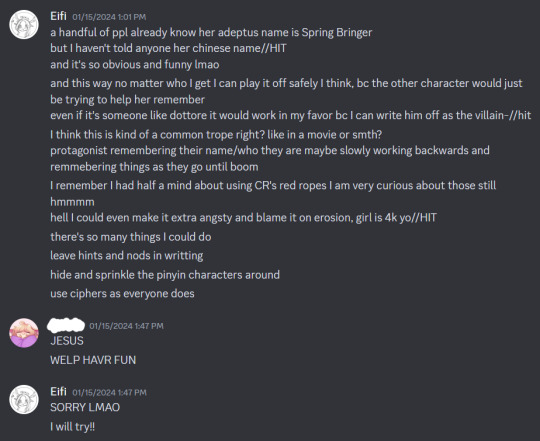
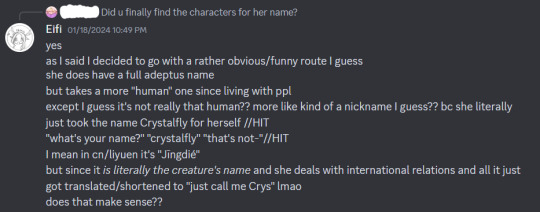
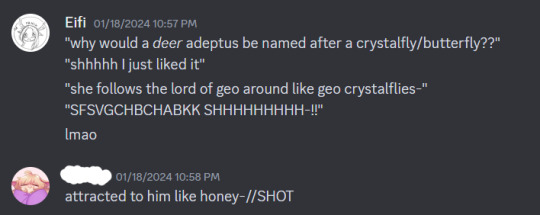
Anyway this got way too long lmao sorrryyyyyyyy thank you everyone kith kith love y'all bye!! 💕
#crys plays ebg#final post aaaaaa this was all so satisfyinga nd fun and such a roller coaster dshvhsjdbvhsbvks#crys lore#new tag aaayyyy//HIT#I will spam more in the future but not too much I prommy#I gotta go back to writing soon I'm itching hhhhhhh#ty everyone ilu all <3#crys yaps
12 notes
·
View notes